ISPS Directors Past and Present
 Joseph LaPalombara (Affiliated with ISPS 1967-1992) has recently concluded his 72nd year of teaching university students. Beginning in 1947 he has taught in leading universities here and in Europe. He has consulted with government agencies, with several major foundations, as well as with dozens of global firms in the U.S. and abroad. He has been the First Secretary of the U.S. Embassy in Rome, Italy. He once formed and presided over Multinational Strategies, Incorporated, a New York firm. He is a founding member of Italy’s Social Science Council, a former trustee of the American Academy in Rome, a former chairman of political science departments at Michigan State and Yale universities, as well as a former director of ISPS itself. His career includes editorships of magazines and academic journals. He has authored hundreds of journalistic articles, scientific papers, and is the editor or author of over a dozen books and monographs. A former vice-president of the American Political Science Association, and president of the Conference Group for the Study of Italian Politics and Society, he is also a member of the Council on Foreign Relations, and of the American Academy of Arts and Sciences. Joseph LaPalombara directed ISPS from 1987-1992.
Joseph LaPalombara (Affiliated with ISPS 1967-1992) has recently concluded his 72nd year of teaching university students. Beginning in 1947 he has taught in leading universities here and in Europe. He has consulted with government agencies, with several major foundations, as well as with dozens of global firms in the U.S. and abroad. He has been the First Secretary of the U.S. Embassy in Rome, Italy. He once formed and presided over Multinational Strategies, Incorporated, a New York firm. He is a founding member of Italy’s Social Science Council, a former trustee of the American Academy in Rome, a former chairman of political science departments at Michigan State and Yale universities, as well as a former director of ISPS itself. His career includes editorships of magazines and academic journals. He has authored hundreds of journalistic articles, scientific papers, and is the editor or author of over a dozen books and monographs. A former vice-president of the American Political Science Association, and president of the Conference Group for the Study of Italian Politics and Society, he is also a member of the Council on Foreign Relations, and of the American Academy of Arts and Sciences. Joseph LaPalombara directed ISPS from 1987-1992.
 Bradford H. Gray (Affiliated with ISPS 1989-1997) grew up on a ranch in the Oklahoma Panhandle and has variously been a staffer for two national ethics commissions, a study director at the Institute of Medicine, a faculty member at the University of North Carolina and Yale (including director of ISPS), the founder of the health & science policy division at the NY Academy of Medicine, a senior fellow at the Urban Institute, senior advisor to the Harkness Fellowship Program at the Commonwealth Fund, and editor of the Milbank Quarterly. He has published extensively on matters pertaining to the ethics of human experimentation, for-profit and nonprofit health care, managed care, the politics of health services research, and the changing conditions of medical professionalism. He was elected to the Institute of Medicine (now the National Academy of Medicine) in 2001. He now serves on the Report Review Committee of the National Academies of Science, Engineering, and Medicine and as chair of the board at The Hastings Center, the bioethics think tank overlooking the Hudson River. His book collection in the history of social thought is at Yale’s Beinecke Library. Brad Gray directed ISPS from 1992-1996.
Bradford H. Gray (Affiliated with ISPS 1989-1997) grew up on a ranch in the Oklahoma Panhandle and has variously been a staffer for two national ethics commissions, a study director at the Institute of Medicine, a faculty member at the University of North Carolina and Yale (including director of ISPS), the founder of the health & science policy division at the NY Academy of Medicine, a senior fellow at the Urban Institute, senior advisor to the Harkness Fellowship Program at the Commonwealth Fund, and editor of the Milbank Quarterly. He has published extensively on matters pertaining to the ethics of human experimentation, for-profit and nonprofit health care, managed care, the politics of health services research, and the changing conditions of medical professionalism. He was elected to the Institute of Medicine (now the National Academy of Medicine) in 2001. He now serves on the Report Review Committee of the National Academies of Science, Engineering, and Medicine and as chair of the board at The Hastings Center, the bioethics think tank overlooking the Hudson River. His book collection in the history of social thought is at Yale’s Beinecke Library. Brad Gray directed ISPS from 1992-1996.
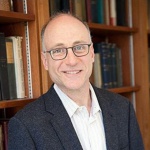 Donald P. Green (Affiliated with ISPS 1989-2011) is J.W. Burgess Professor of Political Science at Columbia University, having moved there in 2011 after 22 years at Yale University. The author of four books and more than one hundred essays, Green studies a wide array of topics: voting behavior, partisanship, campaign finance, hate crime, and research methods. Much of his current work uses field experimentation to study the ways in which political campaigns mobilize and persuade voters. Don Green directed ISPS from 1996-2011.
Donald P. Green (Affiliated with ISPS 1989-2011) is J.W. Burgess Professor of Political Science at Columbia University, having moved there in 2011 after 22 years at Yale University. The author of four books and more than one hundred essays, Green studies a wide array of topics: voting behavior, partisanship, campaign finance, hate crime, and research methods. Much of his current work uses field experimentation to study the ways in which political campaigns mobilize and persuade voters. Don Green directed ISPS from 1996-2011.
 Jacob S. Hacker (Affiliated with ISPS 2002-present) is Stanley Resor Professor of Political Science and Director of the Institution for Social and Policy Studies at Yale University. A regular media commentator and policy adviser, he is the author or co-author of five books, numerous journal articles, and a wide range of popular writings on American politics and public policy. His most recent book, written with Paul Pierson, is American Amnesia: How the War on Government Led Us to Forget What Made America Prosper—a New York Times Book Review Editor’s Choice and a best business book of 2016 according to the management magazine Strategy+Business. Previously, the two wrote the New York Times bestseller Winner-Take-All Politics: How Washington Made the Rich Richer—and Turned Its Back on the Middle Class. Professor Hacker is known for his research and writings regarding health policy, especially his development of the so-called public option. He is also a member of the OECD’s High-Level Expert Group on the Measurement of Economic Performance and Social Progress. He was recently elected to the American Academy of Arts and Sciences. Jacob Hacker has directed ISPS since 2012.
Jacob S. Hacker (Affiliated with ISPS 2002-present) is Stanley Resor Professor of Political Science and Director of the Institution for Social and Policy Studies at Yale University. A regular media commentator and policy adviser, he is the author or co-author of five books, numerous journal articles, and a wide range of popular writings on American politics and public policy. His most recent book, written with Paul Pierson, is American Amnesia: How the War on Government Led Us to Forget What Made America Prosper—a New York Times Book Review Editor’s Choice and a best business book of 2016 according to the management magazine Strategy+Business. Previously, the two wrote the New York Times bestseller Winner-Take-All Politics: How Washington Made the Rich Richer—and Turned Its Back on the Middle Class. Professor Hacker is known for his research and writings regarding health policy, especially his development of the so-called public option. He is also a member of the OECD’s High-Level Expert Group on the Measurement of Economic Performance and Social Progress. He was recently elected to the American Academy of Arts and Sciences. Jacob Hacker has directed ISPS since 2012.
Participants and Attendees
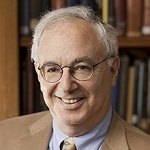 Bruce Ackerman (1971-present) With the exception of a five year stint at Columbia, I’ve been an active participant in one or another ISPS activity for more than 40 years. Apart from deeply rewarding relationships with faculty colleagues and dynamic graduate students, the intense intellectual environment has greatly encouraged my interdisciplinary explorations on the boundaries of philosophy, history and law.
Bruce Ackerman (1971-present) With the exception of a five year stint at Columbia, I’ve been an active participant in one or another ISPS activity for more than 40 years. Apart from deeply rewarding relationships with faculty colleagues and dynamic graduate students, the intense intellectual environment has greatly encouraged my interdisciplinary explorations on the boundaries of philosophy, history and law.
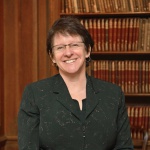 Julia Adams (2004-present) is Professor of Sociology and International & Area Studies and Head of Grace Hopper College. She also co-directs YaleCHESS (Center for Historical Enquiry and the Social Sciences). She is on the Boards of Reed College and the Social Science Research Council. Adams received a National Science Foundation grant for Collaborative research with Hannah Bruckner (Vice-Provost for Faculty Diversity, NYU-Abu Dhabi) on “Wikipedia and the Democratization of Academic Knowledge.” The investigators are analyzing the representation of scholars and scholarship, including gender- and race - specific patterns. One of the project’s goals is to contribute to improving quality and reducing potential bias on digital platforms.
Julia Adams (2004-present) is Professor of Sociology and International & Area Studies and Head of Grace Hopper College. She also co-directs YaleCHESS (Center for Historical Enquiry and the Social Sciences). She is on the Boards of Reed College and the Social Science Research Council. Adams received a National Science Foundation grant for Collaborative research with Hannah Bruckner (Vice-Provost for Faculty Diversity, NYU-Abu Dhabi) on “Wikipedia and the Democratization of Academic Knowledge.” The investigators are analyzing the representation of scholars and scholarship, including gender- and race - specific patterns. One of the project’s goals is to contribute to improving quality and reducing potential bias on digital platforms.
 Rene Almeling (2010-present) is a sociologist at Yale University who specializes in research on gender and medicine. She is the author of Sex Cells, an award-winning book that offers an inside look at the American market for egg donors and sperm donors. Currently, she is completing a new book, Guynecology, on the history of medical knowledge-making about men’s reproduction and its consequences for individual men. She has also conducted two original surveys, the first on Americans’ attitudes toward genetic risk (with Shana Gadarian) and the other on women’s bodily experiences of IVF. Her research has been funded by the National Science Foundation and the Robert Wood Johnson Foundation, and her articles have appeared in American Sociological Review, Annual Review of Sociology, Journal of Health and Social Behavior, and Gender & Society. She is a recipient of the Arthur Greer Memorial Prize for Outstanding Scholarly Research, one of Yale’s highest honors.
Rene Almeling (2010-present) is a sociologist at Yale University who specializes in research on gender and medicine. She is the author of Sex Cells, an award-winning book that offers an inside look at the American market for egg donors and sperm donors. Currently, she is completing a new book, Guynecology, on the history of medical knowledge-making about men’s reproduction and its consequences for individual men. She has also conducted two original surveys, the first on Americans’ attitudes toward genetic risk (with Shana Gadarian) and the other on women’s bodily experiences of IVF. Her research has been funded by the National Science Foundation and the Robert Wood Johnson Foundation, and her articles have appeared in American Sociological Review, Annual Review of Sociology, Journal of Health and Social Behavior, and Gender & Society. She is a recipient of the Arthur Greer Memorial Prize for Outstanding Scholarly Research, one of Yale’s highest honors.
 Vivek Ashkok (2013-2018) is a Presidential Postdoctoral Fellow at Cornell University (2018-2021) and a Postdoctoral Associate in the Department of Government. He is also a faculty affiliate of the Roper Center for Public Opinion Research. He studies American politics, political economy, and methodology. His research centers on understanding how citizens form preferences about economic policies, focusing on their demands for redistribution and government spending. Vivek also works on methodology, with interests in experimental design and analysis, causal inference, and applied statistics. He was a Graduate Student and Policy Fellow at ISPS and served as the founding manager of the ISPS Behavioral Research Lab. Vivek received his Ph.D. in Political Science (2018) and M.A. in Statistics from Yale University.
Vivek Ashkok (2013-2018) is a Presidential Postdoctoral Fellow at Cornell University (2018-2021) and a Postdoctoral Associate in the Department of Government. He is also a faculty affiliate of the Roper Center for Public Opinion Research. He studies American politics, political economy, and methodology. His research centers on understanding how citizens form preferences about economic policies, focusing on their demands for redistribution and government spending. Vivek also works on methodology, with interests in experimental design and analysis, causal inference, and applied statistics. He was a Graduate Student and Policy Fellow at ISPS and served as the founding manager of the ISPS Behavioral Research Lab. Vivek received his Ph.D. in Political Science (2018) and M.A. in Statistics from Yale University.
 Scott Bokemper (2017-present) is currently a Postdoctoral Associate at ISPS and CSAP. He received his PhD from Stony Brook University in 2017. His research uses experimental methods to examine how institutions and human psychology jointly shape political behavior. Particularly, he designs and programs novel economic games to examine the contours of social insurance policy, beneficiary behavior, and program support. He has also worked on a number of other projects about collective decisions, wage discrimination, and cooperation.
Scott Bokemper (2017-present) is currently a Postdoctoral Associate at ISPS and CSAP. He received his PhD from Stony Brook University in 2017. His research uses experimental methods to examine how institutions and human psychology jointly shape political behavior. Particularly, he designs and programs novel economic games to examine the contours of social insurance policy, beneficiary behavior, and program support. He has also worked on a number of other projects about collective decisions, wage discrimination, and cooperation.
 Lori Bruce (2015-present) directs the Summer Institute in Bioethics, Foundations in Bioethics, and other bioethics training programs. Her interests include the amplification of voices and values of community members in health policy and exploring the fragile bonds of trust between patients and physicians. Lori was a founding member of the first community ethics committee (at Harvard), and founded Yale’s Community Bioethics Forum: a group of thoughtful community members who provide perspectives on health and medical policies. Consult requests are brought by state legislators, medical nonprofits, physicians, and ethics committees; recent cases address CT’s Infant Safe Haven law, brain death, and CT’s MOLST law about end-of-life orders. Lori has served on ethics committees at Harvard and Yale and has lectured at universities in Japan, Australia, and the U.S. on a wide range of topics including neuroethics, organ donation, and inequities within U.S. healthcare. Lori has influenced health policy on a range of topics including end-of-life care to international research protocols. She is a member of one of Yale’s IRBs (relating to largescale data/tissue repositories), served as VP for Community Voices in Medical Ethics, and as Executive Director for CT Coalition to Improve End-of-Life Care. Lori holds a bachelor’s degree from Carnegie Mellon University, a graduate degree from Boston University School of Medicine, and additional graduate coursework from Mount Sinai School of Medicine. Her writing appears in various sources including The Hastings Center Report, The Huffington Post, and the blog for the American Journal of Bioethics.
Lori Bruce (2015-present) directs the Summer Institute in Bioethics, Foundations in Bioethics, and other bioethics training programs. Her interests include the amplification of voices and values of community members in health policy and exploring the fragile bonds of trust between patients and physicians. Lori was a founding member of the first community ethics committee (at Harvard), and founded Yale’s Community Bioethics Forum: a group of thoughtful community members who provide perspectives on health and medical policies. Consult requests are brought by state legislators, medical nonprofits, physicians, and ethics committees; recent cases address CT’s Infant Safe Haven law, brain death, and CT’s MOLST law about end-of-life orders. Lori has served on ethics committees at Harvard and Yale and has lectured at universities in Japan, Australia, and the U.S. on a wide range of topics including neuroethics, organ donation, and inequities within U.S. healthcare. Lori has influenced health policy on a range of topics including end-of-life care to international research protocols. She is a member of one of Yale’s IRBs (relating to largescale data/tissue repositories), served as VP for Community Voices in Medical Ethics, and as Executive Director for CT Coalition to Improve End-of-Life Care. Lori holds a bachelor’s degree from Carnegie Mellon University, a graduate degree from Boston University School of Medicine, and additional graduate coursework from Mount Sinai School of Medicine. Her writing appears in various sources including The Hastings Center Report, The Huffington Post, and the blog for the American Journal of Bioethics.
 Paul D. Cleary (2007-present), Ph.D. is the Anna M.R. Lauder Professor of Public Health at the Yale School of Public Health. His research focuses on the quality of medical care, how clinician and organizational characteristics are related to care quality, and the implementation and impact of quality improvement efforts. He is Principal Investigator of a CAHPS (Consumer Assessment of Healthcare Provider and Systems) project funded by the US Agency for Healthcare Research and Quality (AHRQ) and Director of the Yale Center for Interdisciplinary Research on AIDS (CIRA). He has published more than 350 journal articles and book chapters. Dr. Cleary is a member of the U.S. National Academy of Medicine, a member of the Connecticut Academy for Science and Engineering, a Fellow of the American Association for the Advancement of Science, and a distinguished fellow of the Association for Health Services Research. He has received the Distinguished Investigator Award from the Academy for Health Services Research and Health Policy, the Picker Institute Award for Excellence in the Advancement of Patient-Centered Care, and the Leo G. Reeder Award for Distinguished Contribution to Medical Sociology from the American Sociological Association. Dr. Cleary is currently on the Board of the Milbank Memorial Fund.
Paul D. Cleary (2007-present), Ph.D. is the Anna M.R. Lauder Professor of Public Health at the Yale School of Public Health. His research focuses on the quality of medical care, how clinician and organizational characteristics are related to care quality, and the implementation and impact of quality improvement efforts. He is Principal Investigator of a CAHPS (Consumer Assessment of Healthcare Provider and Systems) project funded by the US Agency for Healthcare Research and Quality (AHRQ) and Director of the Yale Center for Interdisciplinary Research on AIDS (CIRA). He has published more than 350 journal articles and book chapters. Dr. Cleary is a member of the U.S. National Academy of Medicine, a member of the Connecticut Academy for Science and Engineering, a Fellow of the American Association for the Advancement of Science, and a distinguished fellow of the Association for Health Services Research. He has received the Distinguished Investigator Award from the Academy for Health Services Research and Health Policy, the Picker Institute Award for Excellence in the Advancement of Patient-Centered Care, and the Leo G. Reeder Award for Distinguished Contribution to Medical Sociology from the American Sociological Association. Dr. Cleary is currently on the Board of the Milbank Memorial Fund.
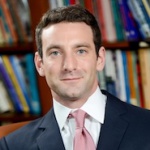 Zack Cooper (2012-present) is an Associate Professor of Public Health and of Economics at Yale University where he also serves as director of Health Policy at the school’s Institution for Social and Policy Studies. Professor Cooper’s work uses big data analysis and randomized trials to produce rigorous scholarship that can transform our understanding of health spending and health care delivery. Cooper has published his research in leading economics and medical journals including the Quarterly Journal of Economics and the New England Journal of Medicine. He has also presented his research at the White House, the Department of Justice, the Federal Trade Commission, and the Department of Health and Human Services. The New York Times wrote that his work is “likely to force a rethinking of some conventional wisdom about health care.” Cooper received his undergraduate degree from the University of Chicago and his PhD from the London School of Economics, where he received the Richard Titmuss prize for Best PhD thesis. He was an Economic and Social Science Research Council Postdoctoral Fellow in economics at the LSE’s Centre for Economic Performance where he remains a Faculty Associate.
Zack Cooper (2012-present) is an Associate Professor of Public Health and of Economics at Yale University where he also serves as director of Health Policy at the school’s Institution for Social and Policy Studies. Professor Cooper’s work uses big data analysis and randomized trials to produce rigorous scholarship that can transform our understanding of health spending and health care delivery. Cooper has published his research in leading economics and medical journals including the Quarterly Journal of Economics and the New England Journal of Medicine. He has also presented his research at the White House, the Department of Justice, the Federal Trade Commission, and the Department of Health and Human Services. The New York Times wrote that his work is “likely to force a rethinking of some conventional wisdom about health care.” Cooper received his undergraduate degree from the University of Chicago and his PhD from the London School of Economics, where he received the Richard Titmuss prize for Best PhD thesis. He was an Economic and Social Science Research Council Postdoctoral Fellow in economics at the LSE’s Centre for Economic Performance where he remains a Faculty Associate.
 Stuart Craig (2010-2015) is a doctoral student at the Wharton School in the department of Health Care Management and Economics. Previously he worked as a Statistician at ISPS, using big data to explore the determinants of health care spending. He is also a Research Associate on the Economic Security Index. He is currently studying consumer protection in the health care sector and the effects of hospital mergers.
Stuart Craig (2010-2015) is a doctoral student at the Wharton School in the department of Health Care Management and Economics. Previously he worked as a Statistician at ISPS, using big data to explore the determinants of health care spending. He is also a Research Associate on the Economic Security Index. He is currently studying consumer protection in the health care sector and the effects of hospital mergers.
Mike Cummings (2015-present) is a communications officer at Yale’s Office of Public Affairs and Communications. He previously served as public relations manager at the Beinecke Rare Book and Manuscript Library. Before coming to Yale, he worked in communications at the New York Civil Liberties Union and as a reporter at daily newspapers in Connecticut and Mississippi.
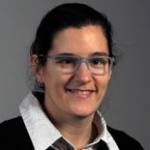 Angele Delevoye (2017-present) is a Ph.D. student in the Political Science Department with research interests in policy-making, social and economic policies, American Politics and quantitative methods. Prior to joining Yale, Angele worked for the French Treasury in the United States, following American economic and financial developments for the French Government and focusing on financial regulation, budgetary, fiscal and health issues. She also worked at the House of Representatives, following debates around the Dodd Frank Act and Affordable Care Act adoptions in 2010. Angele holds a B.A. in Economics and Political Science and a MPA from Sciences Po Paris, as well as a MSc in Business from ESSEC Business School.
Angele Delevoye (2017-present) is a Ph.D. student in the Political Science Department with research interests in policy-making, social and economic policies, American Politics and quantitative methods. Prior to joining Yale, Angele worked for the French Treasury in the United States, following American economic and financial developments for the French Government and focusing on financial regulation, budgetary, fiscal and health issues. She also worked at the House of Representatives, following debates around the Dodd Frank Act and Affordable Care Act adoptions in 2010. Angele holds a B.A. in Economics and Political Science and a MPA from Sciences Po Paris, as well as a MSc in Business from ESSEC Business School.
 Matthew Denney (2016-present) is a third-year Ph.D. student in the Department of Political Science at Yale University, where studies American politics. His research focuses on race and criminal justice in the United States, including crime policy in the 1930s, the application of political theory to race and policing, and the relationship between churches and police in black and Latino communities. He is working (with Adam Thal) through the Policy Lab at ISPS to study the effects of liberal arts in prison.
Matthew Denney (2016-present) is a third-year Ph.D. student in the Department of Political Science at Yale University, where studies American politics. His research focuses on race and criminal justice in the United States, including crime policy in the 1930s, the application of political theory to race and policing, and the relationship between churches and police in black and Latino communities. He is working (with Adam Thal) through the Policy Lab at ISPS to study the effects of liberal arts in prison.
 John F. (Jack) Dovidio (2009-present) is Carl Iver Hovland Professor of Psychology at Yale University; he also serves as the Dean of Academic Affairs of the Faculty of Arts and Sciences. His research interests are in stereotyping, prejudice, and discrimination; unconscious bias; social power and nonverbal communication; and altruism and helping. Much of his scholarship has focused on “aversive racism,” a subtle form of contemporary racism. He has published over 350 articles, chapters, and books. He has received the Kurt Lewin Award from the Society for the Psychological Study of Social Issues (SPSSI) and the Donald Campbell Award from the Society for Personality and Social Psychology (SPSP) for his scholarly achievements. Jack has been president of SPSSI, SPSP, and the Society for Experimental Social Psychology, as well as Executive Officer of SPSP. He has also served as Editor of the Journal of Personality and Social Psychology – Interpersonal Relations and Group Processes, and of Personality and Social Psychology Bulletin, and Co-Editor of Social Issues and Policy Review and consults regularly on issues of racism with a range of government agencies, private companies, and educational institutions.
John F. (Jack) Dovidio (2009-present) is Carl Iver Hovland Professor of Psychology at Yale University; he also serves as the Dean of Academic Affairs of the Faculty of Arts and Sciences. His research interests are in stereotyping, prejudice, and discrimination; unconscious bias; social power and nonverbal communication; and altruism and helping. Much of his scholarship has focused on “aversive racism,” a subtle form of contemporary racism. He has published over 350 articles, chapters, and books. He has received the Kurt Lewin Award from the Society for the Psychological Study of Social Issues (SPSSI) and the Donald Campbell Award from the Society for Personality and Social Psychology (SPSP) for his scholarly achievements. Jack has been president of SPSSI, SPSP, and the Society for Experimental Social Psychology, as well as Executive Officer of SPSP. He has also served as Editor of the Journal of Personality and Social Psychology – Interpersonal Relations and Group Processes, and of Personality and Social Psychology Bulletin, and Co-Editor of Social Issues and Policy Review and consults regularly on issues of racism with a range of government agencies, private companies, and educational institutions.
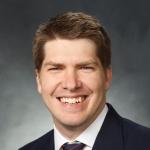 Adam Dynes (2009-2015) received his Ph.D. in political science from Yale in 2015 and since then has been an Assistant Professor in the Department of Political Science at Brigham Young University. His research focuses on legislative behavior with an interest in representation, political psychology, distributive politics, and political parties. In examining these topics, he has studied U.S. elected officials at the national, state, and local levels using surveys, observational data, and experimental methods. Some of this work has been published in the American Political Science Review, the American Journal of Political Science, Legislative Studies Quarterly, and Political Behavior.
Adam Dynes (2009-2015) received his Ph.D. in political science from Yale in 2015 and since then has been an Assistant Professor in the Department of Political Science at Brigham Young University. His research focuses on legislative behavior with an interest in representation, political psychology, distributive politics, and political parties. In examining these topics, he has studied U.S. elected officials at the national, state, and local levels using surveys, observational data, and experimental methods. Some of this work has been published in the American Political Science Review, the American Journal of Political Science, Legislative Studies Quarterly, and Political Behavior.
 Albert Fang (2015-present) is a postdoctoral associate in the Center for the Study of American Politics and the Institution for Social and Policy Studies at Yale University, where he conducts research at the intersection of political psychology; political behavior; race, ethnicity, and identity politics; and the politics of public policy and law. He received a Ph.D. in political science from Columbia University and a B.A. from the University of California, Berkeley.
Albert Fang (2015-present) is a postdoctoral associate in the Center for the Study of American Politics and the Institution for Social and Policy Studies at Yale University, where he conducts research at the intersection of political psychology; political behavior; race, ethnicity, and identity politics; and the politics of public policy and law. He received a Ph.D. in political science from Columbia University and a B.A. from the University of California, Berkeley.
 Eric Feldman (1994-1996) Eric’s expertise is in Japanese law, comparative public health law, torts, and law and society. His books and articles explore the comparative dimensions of rights, dispute resolution, and legal culture, often in the context of urgent policy issues including the regulation of smoking, HIV/AIDS, and natural and nuclear disasters. Feldman has twice been a Fulbright Scholar in Japan and has received grants and fellowships from the Robert Wood Johnson Foundation, the American Bar Association, the National Science Foundation, and the Social Science Research Council, among others. He is the author or editor of books published by Cambridge University Press, Oxford University Press, and Harvard University Press, and his articles have appeared in journals including the California Law Review, Law in Japan, American Journal of Comparative Law, Los Angeles Times, Social and Legal Studies, Hastings Center Report, Lancet, Law and Society Review, the Journal of General Internal Medicine, and the New England Journal of Medicine.
Eric Feldman (1994-1996) Eric’s expertise is in Japanese law, comparative public health law, torts, and law and society. His books and articles explore the comparative dimensions of rights, dispute resolution, and legal culture, often in the context of urgent policy issues including the regulation of smoking, HIV/AIDS, and natural and nuclear disasters. Feldman has twice been a Fulbright Scholar in Japan and has received grants and fellowships from the Robert Wood Johnson Foundation, the American Bar Association, the National Science Foundation, and the Social Science Research Council, among others. He is the author or editor of books published by Cambridge University Press, Oxford University Press, and Harvard University Press, and his articles have appeared in journals including the California Law Review, Law in Japan, American Journal of Comparative Law, Los Angeles Times, Social and Legal Studies, Hastings Center Report, Lancet, Law and Society Review, the Journal of General Internal Medicine, and the New England Journal of Medicine.
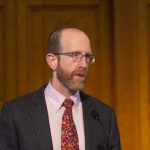 Howie Forman (2013-present) is a Professor of Radiology, Economics, Management, and Public Health (Health Policy) at Yale, where he directs the Health Care Management Program in the YSPH and the MD/MBA, MPH/MBA and EMBA (healthcare track) at the Yale School of Management. He has worked in the U.S. Senate on Medicare policy and recently served as a policy advisor to two CT gubernatorial campaigns (Steve Obsitnik (R) and Ned Lamont (D), the incoming governor of CT. He continues to practice radiology in the emergency/trauma setting at Yale-New Haven Hospital, while playing an active role in departmental finance and compliance matters.
Howie Forman (2013-present) is a Professor of Radiology, Economics, Management, and Public Health (Health Policy) at Yale, where he directs the Health Care Management Program in the YSPH and the MD/MBA, MPH/MBA and EMBA (healthcare track) at the Yale School of Management. He has worked in the U.S. Senate on Medicare policy and recently served as a policy advisor to two CT gubernatorial campaigns (Steve Obsitnik (R) and Ned Lamont (D), the incoming governor of CT. He continues to practice radiology in the emergency/trauma setting at Yale-New Haven Hospital, while playing an active role in departmental finance and compliance matters.
 Justin Fox (2005-2012) is Associate Professor of Political Science at Washington University in St. Louis, where he served as the Department of Political Science’s Director of Undergraduate Studies from 2015 to 2018. Fox’s research applies game theory to the study of American political institutions and issues of representation and accountability. Most of his research employs models of political agency so as to contribute to the literature on how political institutions affect the incentives of public officials and the well-being of citizens. He was a faculty member at Yale University’s Department of Political Science from 2005 to 2012. During that time he was a Resident Fellow of both the Center for the Study of American Politics and the Institution for Social and Policy Studies. For the 2004-2005 academic year, he was a Center for the Study of American Politics Postdoctoral Associate. Fox has also taught at Michigan State, the University of Minnesota, and the IPSA-NUS Summer School for Social Science Methods. He is currently a Visiting Scholar in Economics at Vanderbilt University, and was a Visiting Associate Research Scholar at Princeton University from 2011-2012. He received his B.A. and Ph.D. from the University of Rochester.
Justin Fox (2005-2012) is Associate Professor of Political Science at Washington University in St. Louis, where he served as the Department of Political Science’s Director of Undergraduate Studies from 2015 to 2018. Fox’s research applies game theory to the study of American political institutions and issues of representation and accountability. Most of his research employs models of political agency so as to contribute to the literature on how political institutions affect the incentives of public officials and the well-being of citizens. He was a faculty member at Yale University’s Department of Political Science from 2005 to 2012. During that time he was a Resident Fellow of both the Center for the Study of American Politics and the Institution for Social and Policy Studies. For the 2004-2005 academic year, he was a Center for the Study of American Politics Postdoctoral Associate. Fox has also taught at Michigan State, the University of Minnesota, and the IPSA-NUS Summer School for Social Science Methods. He is currently a Visiting Scholar in Economics at Vanderbilt University, and was a Visiting Associate Research Scholar at Princeton University from 2011-2012. He received his B.A. and Ph.D. from the University of Rochester.
 Tamar Szabó Gendler (2012-2016) is Yale’s inaugural Dean of the Faculty of Arts and Sciences, the Vincent J. Scully Professor of Philosophy, and Professor of Psychology and Cognitive Science. She holds a BA summa cum laude with Distinction in Humanities and in Mathematics-&-Philosophy from Yale University (1987) and a PhD in Philosophy from Harvard University (1996). After teaching at Syracuse and Cornell Universities for nearly a decade, she returned to Yale in 2006 as Professor of Philosophy and Chair of the Cognitive Science Program. In 2009-10, supported by the Mellon Foundation’s New Directions program, she spent a year as a full-time student at Yale doing coursework in psychology, neuroscience, and statistics. In 2010, she was appointed Chair of the Yale philosophy department, becoming the first woman chair in the department’s two-century history. In 2013, she was appointed Deputy Provost for Humanities and Initiatives, a position she held until she assumed her current role.
Tamar Szabó Gendler (2012-2016) is Yale’s inaugural Dean of the Faculty of Arts and Sciences, the Vincent J. Scully Professor of Philosophy, and Professor of Psychology and Cognitive Science. She holds a BA summa cum laude with Distinction in Humanities and in Mathematics-&-Philosophy from Yale University (1987) and a PhD in Philosophy from Harvard University (1996). After teaching at Syracuse and Cornell Universities for nearly a decade, she returned to Yale in 2006 as Professor of Philosophy and Chair of the Cognitive Science Program. In 2009-10, supported by the Mellon Foundation’s New Directions program, she spent a year as a full-time student at Yale doing coursework in psychology, neuroscience, and statistics. In 2010, she was appointed Chair of the Yale philosophy department, becoming the first woman chair in the department’s two-century history. In 2013, she was appointed Deputy Provost for Humanities and Initiatives, a position she held until she assumed her current role.
 Alan Gerber (many years) is the Dean of the Social Science Division of the Faculty of Arts and Science, the Charles C. and Dorathea S. Dilley Professor of Political Science, Faculty in Residence at the Institution for Social and Policy Studies, and director of the Center for the Study of American Politics at Yale University. His current research focuses on the application of experimental methods to the study of campaign communications, and he has designed and performed experimental evaluations of many political communications programs, both partisan and non-partisan in nature. He has received various academic honors and awards, including the Best Book Award from the APSA Organized Section on Experimental Research (2013) and the Heinz Eulau Award for the best article in the American Political Science Review (2002), and was recently selected to be a fellow at the Society for Political Methodology (elected 2016). He was elected to the American Academy of Arts and Sciences (2009) and the American Academy of Political and Social Sciences (2011), and was a fellow at the Center for Advanced Studies in the Behavioral Sciences (2004-2005).
Alan Gerber (many years) is the Dean of the Social Science Division of the Faculty of Arts and Science, the Charles C. and Dorathea S. Dilley Professor of Political Science, Faculty in Residence at the Institution for Social and Policy Studies, and director of the Center for the Study of American Politics at Yale University. His current research focuses on the application of experimental methods to the study of campaign communications, and he has designed and performed experimental evaluations of many political communications programs, both partisan and non-partisan in nature. He has received various academic honors and awards, including the Best Book Award from the APSA Organized Section on Experimental Research (2013) and the Heinz Eulau Award for the best article in the American Political Science Review (2002), and was recently selected to be a fellow at the Society for Political Methodology (elected 2016). He was elected to the American Academy of Arts and Sciences (2009) and the American Academy of Political and Social Sciences (2011), and was a fellow at the Center for Advanced Studies in the Behavioral Sciences (2004-2005).
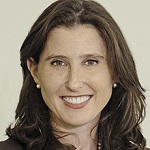 Abbe R. Gluck (2012-present) is a Professor of Law and the Faculty Director of the Solomon Center for Health Law and Policy at Yale Law School. She is an expert on Congress and the political process, federalism, civil procedure, and health law. She has worked in all levels in government, including as a speechwriter in the U.S. Senate and in senior positions in the administrations of New Jersey Governor Jon Corzine and New York City Mayor Michael Bloomberg. She earned her B.A. and J.D. from Yale, and clerked for then-Chief Judge Ralph K. Winter on the U.S. Court of Appeals for the Second Circuit, and for U.S. Supreme Court Justice Ruth Bader Ginsburg. Gluck’s scholarship has been published in the Yale Law Journal, the Harvard Law Review, the Stanford Law Review, the Columbia Law Review, the New England Journal of Medicine, Health Affairs, and many other journals. She is co-author of the casebook Legislation and Interpretation (with Eskridge and Nourse) and she has served as co-counsel in several major litigations concerning the Affordable Care Act. Gluck is past chair of the AALS Section on Legislation and currently serves as an appointed member of both the Uniform Law Commission and the New York State Taskforce on Life and the Law, and as an elected member of the American Law Institute, where she sits on the Council.
Abbe R. Gluck (2012-present) is a Professor of Law and the Faculty Director of the Solomon Center for Health Law and Policy at Yale Law School. She is an expert on Congress and the political process, federalism, civil procedure, and health law. She has worked in all levels in government, including as a speechwriter in the U.S. Senate and in senior positions in the administrations of New Jersey Governor Jon Corzine and New York City Mayor Michael Bloomberg. She earned her B.A. and J.D. from Yale, and clerked for then-Chief Judge Ralph K. Winter on the U.S. Court of Appeals for the Second Circuit, and for U.S. Supreme Court Justice Ruth Bader Ginsburg. Gluck’s scholarship has been published in the Yale Law Journal, the Harvard Law Review, the Stanford Law Review, the Columbia Law Review, the New England Journal of Medicine, Health Affairs, and many other journals. She is co-author of the casebook Legislation and Interpretation (with Eskridge and Nourse) and she has served as co-counsel in several major litigations concerning the Affordable Care Act. Gluck is past chair of the AALS Section on Legislation and currently serves as an appointed member of both the Uniform Law Commission and the New York State Taskforce on Life and the Law, and as an elected member of the American Law Institute, where she sits on the Council.
Matt Graham (2015-present) is a Ph.D. candidate in Political Science. He studies the American public’s democratic competence, including political knowledge and factual beliefs, electoral responsiveness to events outside the government’s control, and the willingness to defend democratic values in a polarized era.
 John Grim (2002-present) is currently a Senior Lecturer and Scholar at Yale University teaching courses that draw students from the School of Forestry and Environmental Studies, Yale Divinity School, the Department of Religious Studies, the Institution for Social and Policy Studies, and the Yale Colleges. He is Coordinator of the Forum on Religion and Ecology with Mary Evelyn Tucker, and series editor of “World Religions and Ecology,” from Harvard Divinity School’s Center for the Study of World Religions.
John Grim (2002-present) is currently a Senior Lecturer and Scholar at Yale University teaching courses that draw students from the School of Forestry and Environmental Studies, Yale Divinity School, the Department of Religious Studies, the Institution for Social and Policy Studies, and the Yale Colleges. He is Coordinator of the Forum on Religion and Ecology with Mary Evelyn Tucker, and series editor of “World Religions and Ecology,” from Harvard Divinity School’s Center for the Study of World Religions.
 Adrian Hale (2015-2016) is a native of Rochester, NY. Adrian is the Senior Manager of Workforce / Economic Development & Education Initiatives at the Greater Rochester Chamber of Commerce. In addition to his responsibilities at the chamber of commerce, Adrian serves on several boards in the greater Rochester community. Most notably as a community board member on the Democrat and Chronicle’s Editorial Board. As a former United States Marine, he made two combat deployments in support of Operation Enduring Freedom to Afghanistan and is a former member of the United States Air Force Reserves. Adrian is a graduate with distinction of Monroe Community College and a recipient of the SUNY Chancellor’s Award for Student Excellence. After graduating from MCC Adrian would transfer to Yale and become an Undergraduate Fellow at the Institution for Social and Policy Studies where he focused on education reform and police accountability. Adrian currently holds a Bachelor of Arts in Political Science from Yale University.
Adrian Hale (2015-2016) is a native of Rochester, NY. Adrian is the Senior Manager of Workforce / Economic Development & Education Initiatives at the Greater Rochester Chamber of Commerce. In addition to his responsibilities at the chamber of commerce, Adrian serves on several boards in the greater Rochester community. Most notably as a community board member on the Democrat and Chronicle’s Editorial Board. As a former United States Marine, he made two combat deployments in support of Operation Enduring Freedom to Afghanistan and is a former member of the United States Air Force Reserves. Adrian is a graduate with distinction of Monroe Community College and a recipient of the SUNY Chancellor’s Award for Student Excellence. After graduating from MCC Adrian would transfer to Yale and become an Undergraduate Fellow at the Institution for Social and Policy Studies where he focused on education reform and police accountability. Adrian currently holds a Bachelor of Arts in Political Science from Yale University.
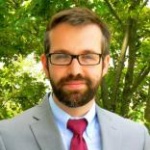 John Henderson (2013-present) is an Assistant Professor in the Department of Political Science at Yale University, and a Resident Fellow with the Center for the Study of American Politics and the Institution for Social and Policy Studies. He studies the consequences of polarization on representation and policymaking in the U.S., as well as the causes of participation and vote choice in congressional and presidential elections.
John Henderson (2013-present) is an Assistant Professor in the Department of Political Science at Yale University, and a Resident Fellow with the Center for the Study of American Politics and the Institution for Social and Policy Studies. He studies the consequences of polarization on representation and policymaking in the U.S., as well as the causes of participation and vote choice in congressional and presidential elections.
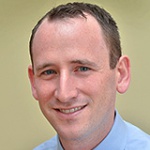 Eitan Hersh (2011-2017) is an associate professor of political science at Tufts University. His research is on U.S. elections, civic engagement, and voting rights. He was an assistant professor and resident fellow of ISPS from 2011-2017.
Eitan Hersh (2011-2017) is an associate professor of political science at Tufts University. His research is on U.S. elections, civic engagement, and voting rights. He was an assistant professor and resident fellow of ISPS from 2011-2017.
 Gregory Huber (2002-present) is the Forst Family Professor of Political Science, a resident fellow of the Institution for Social and Policy Studies, Associate Director of the Center for the Study of American Politics, and founding director of the ISPS Behavioral Research Lab. In addition, he is an associate editor of the Quarterly Journal of Political Science and has served on the National Science Foundation review panel for support of political science research. Prior to joining the faculty at Yale, he held the Robert Hartley fellowship in Governmental Studies at the Brookings Institution.
Gregory Huber (2002-present) is the Forst Family Professor of Political Science, a resident fellow of the Institution for Social and Policy Studies, Associate Director of the Center for the Study of American Politics, and founding director of the ISPS Behavioral Research Lab. In addition, he is an associate editor of the Quarterly Journal of Political Science and has served on the National Science Foundation review panel for support of political science research. Prior to joining the faculty at Yale, he held the Robert Hartley fellowship in Governmental Studies at the Brookings Institution.
 Annabelle Hutchinson (2015-present) is a fourth-year PhD student studying American politics, political economy and social policy. Annabelle’s current research focuses on gender and income inequality in the United States.
Annabelle Hutchinson (2015-present) is a fourth-year PhD student studying American politics, political economy and social policy. Annabelle’s current research focuses on gender and income inequality in the United States.
 Sophie Jacobson (2014-present) is a PhD candidate in political science. Her research focuses on social policy and inequality in the United States and other advanced democracies. Sophie has been involved with coordinating undergraduate fellowships at ISPS since beginning graduate school and currently oversees the Dahl Research Scholars program.
Sophie Jacobson (2014-present) is a PhD candidate in political science. Her research focuses on social policy and inequality in the United States and other advanced democracies. Sophie has been involved with coordinating undergraduate fellowships at ISPS since beginning graduate school and currently oversees the Dahl Research Scholars program.
 Joshua Kalla (2009-2014) is Assistant Professor of Political Science at Yale University with a secondary appointment as Assistant Professor of Statistics and Data Science. He received his Ph.D. in political science from the University of California, Berkeley (2018) and his B.A. from Yale (Morse College, 2014). His research studies political persuasion, prejudice reduction, and decision-making among voters and political elites, primarily through the use of randomized field experiments.
Joshua Kalla (2009-2014) is Assistant Professor of Political Science at Yale University with a secondary appointment as Assistant Professor of Statistics and Data Science. He received his Ph.D. in political science from the University of California, Berkeley (2018) and his B.A. from Yale (Morse College, 2014). His research studies political persuasion, prejudice reduction, and decision-making among voters and political elites, primarily through the use of randomized field experiments.
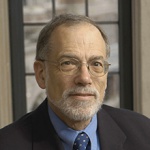 Alvin Klevorick (1970s-present) is the John Thomas Smith Professor of Law at Yale Law School, and Professor of Economics in the Department of Economics at Yale University. His subject areas are antitrust and economic regulation, law and economics, torts, market organization, and economic theory.
Alvin Klevorick (1970s-present) is the John Thomas Smith Professor of Law at Yale Law School, and Professor of Economics in the Department of Economics at Yale University. His subject areas are antitrust and economic regulation, law and economics, torts, market organization, and economic theory.
 Amanda Kowalski (2012-2018) the Gail Wilensky Professor of Applied Economics and Public Policy at the University of Michigan Department of Economics, is a health economist who specializes in bringing together theoretical models and econometric techniques to answer questions that inform current debates in health policy. Professor Kowalski’s recent research advances methods to analyze experiments and clinical trials with the goal of designing policies to target insurance expansions and medical treatments to individuals who will benefit from them the most. Her previous research has explored the impact of Medicaid expansions, the Affordable Care Act, the Massachusetts health reform of 2006, and employer-sponsored health insurance plans. She has been honored with an NSF CAREER Award and the Yale Arthur Greer Memorial Prize. Her research has received the HCUP Outstanding Article of the Year Award, the Garfield Economic Impact Award, the NIHCM Research Award, and the Zellner Thesis Award. Formerly an Associate Professor at the Yale Department of Economics, she has held yearlong positions at the White House, the NBER, Brookings, Stanford, and Princeton. She holds a PhD from MIT and an AB from Harvard.
Amanda Kowalski (2012-2018) the Gail Wilensky Professor of Applied Economics and Public Policy at the University of Michigan Department of Economics, is a health economist who specializes in bringing together theoretical models and econometric techniques to answer questions that inform current debates in health policy. Professor Kowalski’s recent research advances methods to analyze experiments and clinical trials with the goal of designing policies to target insurance expansions and medical treatments to individuals who will benefit from them the most. Her previous research has explored the impact of Medicaid expansions, the Affordable Care Act, the Massachusetts health reform of 2006, and employer-sponsored health insurance plans. She has been honored with an NSF CAREER Award and the Yale Arthur Greer Memorial Prize. Her research has received the HCUP Outstanding Article of the Year Award, the Garfield Economic Impact Award, the NIHCM Research Award, and the Zellner Thesis Award. Formerly an Associate Professor at the Yale Department of Economics, she has held yearlong positions at the White House, the NBER, Brookings, Stanford, and Princeton. She holds a PhD from MIT and an AB from Harvard.
 Stephen R. Latham (2007-present), JD, PhD, is Director of the Yale Interdisciplinary Center for Bioethics. He received his bachelor’s and law degrees from Harvard, and his doctorate in Jurisprudence and Social Policy from UC Berkeley. Before entering academics, he was Director of Ethics Standards at the AMA, and Secretary to its Council on Ethical and Judicial Affairs. At Yale, Latham chairs the social/behavioral, and one of the medical, IRBs; co-chairs the Embryonic Stem Cell Research Oversight Committee; and is a member of the Yale-New Haven Children’s Hospital ethics committee. He is currently a Whitney Humanities Center Fellow and has been a Graduate Fellow of Harvard’s Safra Center on Ethics and a Research Fellow of the University of Edinburgh’s Institute for Advanced Studies in the Humanities. He is Secretary of the American Society for Bioethics and Humanities, from which he has received a Distinguished Service Award. Latham teaches bioethics-related courses in Political Science, Philosophy and EPE, as well as at the Yale Law School. He is author of over 100 publications on bioethics and health law.
Stephen R. Latham (2007-present), JD, PhD, is Director of the Yale Interdisciplinary Center for Bioethics. He received his bachelor’s and law degrees from Harvard, and his doctorate in Jurisprudence and Social Policy from UC Berkeley. Before entering academics, he was Director of Ethics Standards at the AMA, and Secretary to its Council on Ethical and Judicial Affairs. At Yale, Latham chairs the social/behavioral, and one of the medical, IRBs; co-chairs the Embryonic Stem Cell Research Oversight Committee; and is a member of the Yale-New Haven Children’s Hospital ethics committee. He is currently a Whitney Humanities Center Fellow and has been a Graduate Fellow of Harvard’s Safra Center on Ethics and a Research Fellow of the University of Edinburgh’s Institute for Advanced Studies in the Humanities. He is Secretary of the American Society for Bioethics and Humanities, from which he has received a Distinguished Service Award. Latham teaches bioethics-related courses in Political Science, Philosophy and EPE, as well as at the Yale Law School. He is author of over 100 publications on bioethics and health law.
 Evie Lindemann (2000-2015) is currently an Associate Professor in the Master of Arts in Art Therapy Program at Albertus Magnus College. Taught for 7 years in the Shep Nuland Summer Bioethics Program; a specialist on mortality issues, grief and loss; frequent travels internationally to teach and conduct art therapy workshops. Last year traveled to India and created an identity project for adolescent girls in an HIV/AIDS orphanage using art therapy as a medium for self expression. Engages in local community building projects involving adolescent refugees, the homeless, and arts based groups. Also a printmaking artist who was featured at mActivity for Open Studios 2018.
Evie Lindemann (2000-2015) is currently an Associate Professor in the Master of Arts in Art Therapy Program at Albertus Magnus College. Taught for 7 years in the Shep Nuland Summer Bioethics Program; a specialist on mortality issues, grief and loss; frequent travels internationally to teach and conduct art therapy workshops. Last year traveled to India and created an identity project for adolescent girls in an HIV/AIDS orphanage using art therapy as a medium for self expression. Engages in local community building projects involving adolescent refugees, the homeless, and arts based groups. Also a printmaking artist who was featured at mActivity for Open Studios 2018.
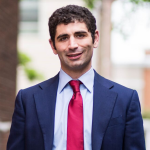 Nate Loewentheil (2011-2013) hails proudly from Baltimore, MD. He is an investor, social entrepreneur, political advocate, and nationally recognized public policy expert. Nate is currently working in venture capital, where he focuses on technology companies reshaping how we design, build, and live in cities. Previously, Nate served as a Special Assistant to the President at the National Economic Council at the White House under President Obama, where he advised the President on urban policy, transportation, and emerging technology. Nate has founded numerous successfully social enterprises, including Baltimore Homecoming and the Roosevelt National Network. His writing has appeared in The Baltimore Sun, Washington Post, The New York Times, Salon, Politico and The Democracy Journal. While at Yale Law School, he was honored to work with Professor Jacob Hacker to expand ISPS programming and co-authored with Hacker a major national report, Prosperity Economics.
Nate Loewentheil (2011-2013) hails proudly from Baltimore, MD. He is an investor, social entrepreneur, political advocate, and nationally recognized public policy expert. Nate is currently working in venture capital, where he focuses on technology companies reshaping how we design, build, and live in cities. Previously, Nate served as a Special Assistant to the President at the National Economic Council at the White House under President Obama, where he advised the President on urban policy, transportation, and emerging technology. Nate has founded numerous successfully social enterprises, including Baltimore Homecoming and the Roosevelt National Network. His writing has appeared in The Baltimore Sun, Washington Post, The New York Times, Salon, Politico and The Democracy Journal. While at Yale Law School, he was honored to work with Professor Jacob Hacker to expand ISPS programming and co-authored with Hacker a major national report, Prosperity Economics.
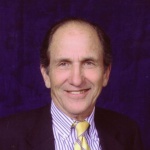 Ted Marmor (1970-2009) Ted’s scholarship primarily concerns welfare state politics and policy in North America and Western Europe. He particularly emphasizes the major spending programs, which is reflected in the second edition of The Politics of Medicare, Aldine de Gruyter, 2000 and the book written with colleagues Mashaw and Harvey in the early l990s, America’s Misunderstood Welfare State, Basic Books, l992. The author or co-author of eleven books, Marmor has published over a hundred articles in a wide range of scholarly journals, as well as being a frequent op-ed contributor to U.S. and Canadian newspapers.
Ted Marmor (1970-2009) Ted’s scholarship primarily concerns welfare state politics and policy in North America and Western Europe. He particularly emphasizes the major spending programs, which is reflected in the second edition of The Politics of Medicare, Aldine de Gruyter, 2000 and the book written with colleagues Mashaw and Harvey in the early l990s, America’s Misunderstood Welfare State, Basic Books, l992. The author or co-author of eleven books, Marmor has published over a hundred articles in a wide range of scholarly journals, as well as being a frequent op-ed contributor to U.S. and Canadian newspapers.
 Jerry L. Mashaw (1978-200?) is Sterling Professor of Law Emeritus and Professorial Lecturer at Yale Law School, where he teaches courses on Administrative Law, Regulation, and the Design of Public Institutions. His prize-winning books include Bureaucratic Justice (1983), The Struggle for Auto Safety (with David Harfst 1990), Greed, Chaos, and Governance: Using Public Choice to Improve Public Law (1997), and Creating the Administrative Constitution: The Lost 100 Years of American Administrative Law (2013).. His most recent book is Reasoned Administration: How Administrative Law Promotes American Democracy (2018).
Jerry L. Mashaw (1978-200?) is Sterling Professor of Law Emeritus and Professorial Lecturer at Yale Law School, where he teaches courses on Administrative Law, Regulation, and the Design of Public Institutions. His prize-winning books include Bureaucratic Justice (1983), The Struggle for Auto Safety (with David Harfst 1990), Greed, Chaos, and Governance: Using Public Choice to Improve Public Law (1997), and Creating the Administrative Constitution: The Lost 100 Years of American Administrative Law (2013).. His most recent book is Reasoned Administration: How Administrative Law Promotes American Democracy (2018).
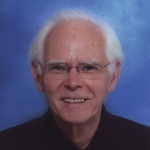 David Mayhew (1968-present) is Sterling Professor Emeritus of Political Science. He has been an American Political Science Association Congressional Fellow, a Guggenheim Fellow, a Hoover National Fellow, a Sherman Fairchild Fellow at the California Institute of Technology, a Fellow at the Center for Advanced Study in the Behavioral Sciences, a member of the American Political Science Association National Council, a member of the board of overseers of the National Election Studies of the Center for Political Studies and is a Fellow of the American Academy of Arts and Sciences and a member of the American Philosophical Society and the National Academy of Sciences. In 2000-2001, he was John M. Olin Visiting Professor in American Government at Nuffield College, Oxford. His research concerns U.S. legislative behavior, U.S. political parties, and U.S. policymaking. Publications include: The Imprint of Congress; Party Loyalty Among Congressmen; Congress: The Electoral Connection; Placing Parties in American Politics; Divided We Govern; America’s Congress: Actions in the Public Sphere, James Madison through Newt Gingrich; Realignments: A Critique of an American Genre; Parties and Policies: How the American Government Works; and Partisan Balance: Why Political Parties Don’t Kill the U.S. Constitutional System.
David Mayhew (1968-present) is Sterling Professor Emeritus of Political Science. He has been an American Political Science Association Congressional Fellow, a Guggenheim Fellow, a Hoover National Fellow, a Sherman Fairchild Fellow at the California Institute of Technology, a Fellow at the Center for Advanced Study in the Behavioral Sciences, a member of the American Political Science Association National Council, a member of the board of overseers of the National Election Studies of the Center for Political Studies and is a Fellow of the American Academy of Arts and Sciences and a member of the American Philosophical Society and the National Academy of Sciences. In 2000-2001, he was John M. Olin Visiting Professor in American Government at Nuffield College, Oxford. His research concerns U.S. legislative behavior, U.S. political parties, and U.S. policymaking. Publications include: The Imprint of Congress; Party Loyalty Among Congressmen; Congress: The Electoral Connection; Placing Parties in American Politics; Divided We Govern; America’s Congress: Actions in the Public Sphere, James Madison through Newt Gingrich; Realignments: A Critique of an American Genre; Parties and Policies: How the American Government Works; and Partisan Balance: Why Political Parties Don’t Kill the U.S. Constitutional System.
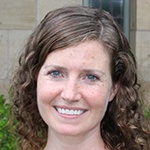 Mary McGrath (2011-2016) is an Assistant Professor of Political Science at Northwestern University, and Faculty Fellow at Northwestern’s Institute for Policy Research. Mary was a research assistant for Don Green, an editorial assistant for Bob Lane, and a member of the inaugural class of ISPS Policy Fellows. Mary has an MEM from the Forestry School and a PhD in Political Science from Yale. Her favorite food is still Modern Apizza, even though she now lives in Chicago, surrounded by deep dish.
Mary McGrath (2011-2016) is an Assistant Professor of Political Science at Northwestern University, and Faculty Fellow at Northwestern’s Institute for Policy Research. Mary was a research assistant for Don Green, an editorial assistant for Bob Lane, and a member of the inaugural class of ISPS Policy Fellows. Mary has an MEM from the Forestry School and a PhD in Political Science from Yale. Her favorite food is still Modern Apizza, even though she now lives in Chicago, surrounded by deep dish.
 Will McGrew (2015-2017) is a Research Assistant at the Washington Center for Equitable Growth. His primary research interests are education, labor markets, housing, public finance, political economy, law and economics, and micro-econometrics. Prior to joining Equitable Growth, he was a Research Assistant at Yale Law School and both a Dahl Research Scholar and Director’s Fellow at the Yale Institution for Social and Policy Studies. During summers in college, he interned at Morgan Stanley Public Finance, the Washington Center for Equitable Growth, and Hillary for America. Will graduated from Yale University in 2018 with a bachelor’s in economics and political science. He is fluent in French and Spanish and proficient in Arabic.
Will McGrew (2015-2017) is a Research Assistant at the Washington Center for Equitable Growth. His primary research interests are education, labor markets, housing, public finance, political economy, law and economics, and micro-econometrics. Prior to joining Equitable Growth, he was a Research Assistant at Yale Law School and both a Dahl Research Scholar and Director’s Fellow at the Yale Institution for Social and Policy Studies. During summers in college, he interned at Morgan Stanley Public Finance, the Washington Center for Equitable Growth, and Hillary for America. Will graduated from Yale University in 2018 with a bachelor’s in economics and political science. He is fluent in French and Spanish and proficient in Arabic.
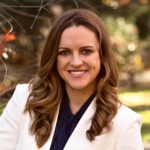 Torey McMurdo (2015-present) is a political science Ph.D. candidate, with a research focus on cyber conflict and information warfare, and a pre-doctoral fellow at the U.S. Naval War College. She concurrently serves as a commissioned officer in the U.S. Navy. Prior to pursuing a Ph.D., McMurdo worked as a strategy consultant in Silicon Valley, reporting directly to former Secretary of State Condoleezza Rice, Secretary of Defense Robert M. Gates, and National Security Advisor Stephen J. Hadley. In this capacity, she helped advise senior executives of leading tech, logistics and financial companies on the political risks and opportunities of investing in emerging markets. Previously, she worked at Stanford University, where she served as a research assistant at Stanford’s Graduate School of Business and Center for International Security and Cooperation. She has also held positions with the U.S. Department of State’s Bureau for Near Eastern Affairs and The Walt Disney Company. Originally from San Diego, McMurdo holds a B.A., magna cum laude with highest honors in political science from UCLA, and a M.A. in political science and Master of Philosophy from Yale. She was previously a graduate fellow at Yale’s Institute for Social and Policy Studies, and Yale Law School’s Information Society Project.
Torey McMurdo (2015-present) is a political science Ph.D. candidate, with a research focus on cyber conflict and information warfare, and a pre-doctoral fellow at the U.S. Naval War College. She concurrently serves as a commissioned officer in the U.S. Navy. Prior to pursuing a Ph.D., McMurdo worked as a strategy consultant in Silicon Valley, reporting directly to former Secretary of State Condoleezza Rice, Secretary of Defense Robert M. Gates, and National Security Advisor Stephen J. Hadley. In this capacity, she helped advise senior executives of leading tech, logistics and financial companies on the political risks and opportunities of investing in emerging markets. Previously, she worked at Stanford University, where she served as a research assistant at Stanford’s Graduate School of Business and Center for International Security and Cooperation. She has also held positions with the U.S. Department of State’s Bureau for Near Eastern Affairs and The Walt Disney Company. Originally from San Diego, McMurdo holds a B.A., magna cum laude with highest honors in political science from UCLA, and a M.A. in political science and Master of Philosophy from Yale. She was previously a graduate fellow at Yale’s Institute for Social and Policy Studies, and Yale Law School’s Information Society Project.
 Paul Merklinger (2017) is a doctoral student in Yale’s political science department. His research focuses on the domestic political implications of civ-mil relations, perception of veterans, and online political behavior. Paul serves as an active-duty United States Army Aviation officer. Following his time at Yale, Paul will teach American Politics in the Department of Social Sciences at the United States Military Academy at West Point.
Paul Merklinger (2017) is a doctoral student in Yale’s political science department. His research focuses on the domestic political implications of civ-mil relations, perception of veterans, and online political behavior. Paul serves as an active-duty United States Army Aviation officer. Following his time at Yale, Paul will teach American Politics in the Department of Social Sciences at the United States Military Academy at West Point.
Ben Miller (2013-present) earned a BA with distinction in economics and mathematics from Amherst College in 2012. He is the coauthor (with Peter Aronow) of Foundations of Agnostic Statistics, which will be published in January by Cambridge University Press. Ben’s dissertation research is on the politics of gun ownership and gun control.
Patrick R. O’Brien (2011-2018) is a postdoctoral fellow in the Public Policy Graduate Program at Trinity College. His research interests include the presidency, public policy, public administration, and American political development. He is currently finishing a book manuscript that examines variation in presidential control over public finance policy administration and policy.
 Molly Offer-Westort (2014-present) is a doctoral candidate in Political Science and Statistics & Data Science at Yale University. Her focus is on quantitative methodology for social science research, as well as how group experiences and social identity affect redistributive preferences.
Molly Offer-Westort (2014-present) is a doctoral candidate in Political Science and Statistics & Data Science at Yale University. Her focus is on quantitative methodology for social science research, as well as how group experiences and social identity affect redistributive preferences.
 Lilla Orr (2015-present) is a doctoral candidate in Political Science. Her research examines group conflict within political and health behavior, including political polarization and health effects of discrimination. As an ISPS policy fellow she is studying the policy response to the modern opioid epidemic in the United States. Prior to pursuing graduate studies, Lilla completed a B.S. in Biochemistry and Cell Biology at the University of California, San Diego.
Lilla Orr (2015-present) is a doctoral candidate in Political Science. Her research examines group conflict within political and health behavior, including political polarization and health effects of discrimination. As an ISPS policy fellow she is studying the policy response to the modern opioid epidemic in the United States. Prior to pursuing graduate studies, Lilla completed a B.S. in Biochemistry and Cell Biology at the University of California, San Diego.
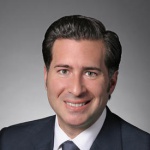 Costas Panagopoulos (2005-2006; 2016-2017) is professor of political science and director of big data and quantitative initiatives within the College of Social Sciences and Humanities. A leading expert on campaigns and elections, voting behavior, political psychology, campaign finance, and experimental research, Dr. Panagopoulos has been part of the Decision Desk team at NBC News since the 2006 election cycle. He is also editor of American Politics Research, a peer-reviewed journal published by Sage. Panagopoulos was previously professor in the political science department at Fordham University, where he was also director and founder of the Center for Electoral Politics and Democracy and the graduate program in elections and campaign management, and an adjunct professor of quantitative methods at Columbia University. In 2015-2016, Dr. Panagopoulos was visiting professor of political science and resident fellow at the Institution for Social and Policy Studies at Yale University. He was selected by the American Political Science Association as a Congressional Fellow during 2004-2005, and he served in the office of Senator Hillary Rodham Clinton (D-NY).
Costas Panagopoulos (2005-2006; 2016-2017) is professor of political science and director of big data and quantitative initiatives within the College of Social Sciences and Humanities. A leading expert on campaigns and elections, voting behavior, political psychology, campaign finance, and experimental research, Dr. Panagopoulos has been part of the Decision Desk team at NBC News since the 2006 election cycle. He is also editor of American Politics Research, a peer-reviewed journal published by Sage. Panagopoulos was previously professor in the political science department at Fordham University, where he was also director and founder of the Center for Electoral Politics and Democracy and the graduate program in elections and campaign management, and an adjunct professor of quantitative methods at Columbia University. In 2015-2016, Dr. Panagopoulos was visiting professor of political science and resident fellow at the Institution for Social and Policy Studies at Yale University. He was selected by the American Political Science Association as a Congressional Fellow during 2004-2005, and he served in the office of Senator Hillary Rodham Clinton (D-NY).
 Limor Peer (2008-present), PhD is Associate Director for Research at the Institution for Social and Policy Studies (ISPS) at Yale University, where she oversees research infrastructure and communication. At ISPS, she led the creation of a specialized research data archive (the ISPS Data Archive), a digital repository for research produced by scholars affiliated with ISPS with a focus on experimental design and methods. She is responsible for establishing Archive policies and for designing a model workflow for sharing and preserving research data that implements the ideals of scientific reproducibility and transparency. Peer co-founded Curation for Reproducibility (CURE), a consortium of social science data archives at Yale, Cornell, and the University of North Carolina, promoting practices that facilitate the digital preservation of the evidence base necessary for future understanding, evaluation, and reproducibility of scientific claims. She sits on the board of the Roper Center for Public Opinion Research and serves on a number of advisory and task force groups working on data curation and research transparency. At Yale, she is involved in campus-wide efforts relating to research data management, sharing, and preservation, and has spearheaded policy development on these issues.
Limor Peer (2008-present), PhD is Associate Director for Research at the Institution for Social and Policy Studies (ISPS) at Yale University, where she oversees research infrastructure and communication. At ISPS, she led the creation of a specialized research data archive (the ISPS Data Archive), a digital repository for research produced by scholars affiliated with ISPS with a focus on experimental design and methods. She is responsible for establishing Archive policies and for designing a model workflow for sharing and preserving research data that implements the ideals of scientific reproducibility and transparency. Peer co-founded Curation for Reproducibility (CURE), a consortium of social science data archives at Yale, Cornell, and the University of North Carolina, promoting practices that facilitate the digital preservation of the evidence base necessary for future understanding, evaluation, and reproducibility of scientific claims. She sits on the board of the Roper Center for Public Opinion Research and serves on a number of advisory and task force groups working on data curation and research transparency. At Yale, she is involved in campus-wide efforts relating to research data management, sharing, and preservation, and has spearheaded policy development on these issues.
 Charles “Chick” Perrow (1982-1998) taught at Michigan, Pittsburgh, Wisconsin, Stony Brook, and Yale. His interest is in large organizations and their power to shape society, resulting in a history of capitalism in the US (“Organizing America”) and extensive work on disasters, such as Three Mile Island, Gulf Oil spill, Fukushima and more associated with Neo-liberalism. (“Normal Accidents” and “The Nest Catastrophe.”) His last project was on regulatory agencies, but he is through publishing at age 93.
Charles “Chick” Perrow (1982-1998) taught at Michigan, Pittsburgh, Wisconsin, Stony Brook, and Yale. His interest is in large organizations and their power to shape society, resulting in a history of capitalism in the US (“Organizing America”) and extensive work on disasters, such as Three Mile Island, Gulf Oil spill, Fukushima and more associated with Neo-liberalism. (“Normal Accidents” and “The Nest Catastrophe.”) His last project was on regulatory agencies, but he is through publishing at age 93.
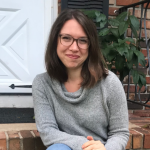 Gwen Prowse (2016-present) is a joint doctoral student in political science and African American studies, with a focus on race and political economy in the United States. Her research explores how state policies shape civic agency, federalism, and how the legacy of slavery shapes political institutions. She is a research fellow with the Institute for Social Policy Studies (ISPS) and affiliated with the Justice Collaboratory at Yale Law School.
Gwen Prowse (2016-present) is a joint doctoral student in political science and African American studies, with a focus on race and political economy in the United States. Her research explores how state policies shape civic agency, federalism, and how the legacy of slavery shapes political institutions. She is a research fellow with the Institute for Social Policy Studies (ISPS) and affiliated with the Justice Collaboratory at Yale Law School.
 Celene Reynolds (2015-present) is a PhD candidate in the Department of Sociology at Yale. She studies why antidiscrimination law is used and interpreted differently in organizations over time, despite the fact that the letter of the law remains the same. Her dissertation project and book manuscript examine this question using the case of Title IX, the 1972 U.S. civil rights law that prohibits sex discrimination in education. Her research is supported by the National Science Foundation, the National Academy of Education/Spencer Foundation, and the Horowitz Foundation for Social Policy.
Celene Reynolds (2015-present) is a PhD candidate in the Department of Sociology at Yale. She studies why antidiscrimination law is used and interpreted differently in organizations over time, despite the fact that the letter of the law remains the same. Her dissertation project and book manuscript examine this question using the case of Title IX, the 1972 U.S. civil rights law that prohibits sex discrimination in education. Her research is supported by the National Science Foundation, the National Academy of Education/Spencer Foundation, and the Horowitz Foundation for Social Policy.
 Jennifer A. Richeson (2016-present) is the Philip R. Allen Professor of Psychology at Yale University and Director of the Social Perception and Communication Lab. She received a Bachelor of Science in psychology from Brown University, and a M.A. and Ph.D. in social psychology from Harvard University. Prior to joining the Yale faculty in 2016, she was the John D. & Catherine T. MacArthur Professor of Psychology at Northwestern University, where she was also a Faculty Fellow at the Institute for Policy Research. Professor Richeson investigates the social psychology of cultural diversity. Specifically, she examines processes of mind that influence the ways in which people experience diversity, with a primary focus on the psychological dynamics that create, sustain, and sometimes challenge societal inequality. Some of her recent research considers the psychological and political consequences of increasing racial, ethnic, and other forms of cultural diversity, most notably the rising racial/ethnic diversity of the nation. She and her students are also currently investigating how people reason about and respond to different forms of inequality and the implications of such processes for detecting and confronting injustice.
Jennifer A. Richeson (2016-present) is the Philip R. Allen Professor of Psychology at Yale University and Director of the Social Perception and Communication Lab. She received a Bachelor of Science in psychology from Brown University, and a M.A. and Ph.D. in social psychology from Harvard University. Prior to joining the Yale faculty in 2016, she was the John D. & Catherine T. MacArthur Professor of Psychology at Northwestern University, where she was also a Faculty Fellow at the Institute for Policy Research. Professor Richeson investigates the social psychology of cultural diversity. Specifically, she examines processes of mind that influence the ways in which people experience diversity, with a primary focus on the psychological dynamics that create, sustain, and sometimes challenge societal inequality. Some of her recent research considers the psychological and political consequences of increasing racial, ethnic, and other forms of cultural diversity, most notably the rising racial/ethnic diversity of the nation. She and her students are also currently investigating how people reason about and respond to different forms of inequality and the implications of such processes for detecting and confronting injustice.
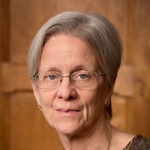 Susan Rose-Ackerman (1968-1982; 1987-2018) is the Henry R. Luce Professor of Jurisprudence (Law and Political Science), Yale University. Her current research and teaching interests are the comparative study of administrative law and public policy making, and the political economy of corruption and its control. Her most recent books are Due Process of Lawmaking: The United States South Africa, Germany and the European Union (with Stefanie Egidy and James Fowkes, 2015); Greed, Corruption, and the Modern State: Essays in Political Economy (editor with Paul Lagunes, 2015); Corruption and Government: Causes, Consequences and Reform, second edition with Bonnie Palifka, forthcoming 2016 (first edition published in 1999 was translated into 17 languages); Comparative Administrative Law (editor with Peter Lindseth, 2010), International Handbook on the Economics of Corruption (vol. I, editor, 2006; vol. II, editor with Tina Søreide, 2011); From Elections to Democracy: Building Accountable Government in Hungary and Poland (2005); She directs the program in Comparative Administrative Law at Yale Law School, and she holds a B.A. from Wellesley College and a Ph.D. from Yale University.
Susan Rose-Ackerman (1968-1982; 1987-2018) is the Henry R. Luce Professor of Jurisprudence (Law and Political Science), Yale University. Her current research and teaching interests are the comparative study of administrative law and public policy making, and the political economy of corruption and its control. Her most recent books are Due Process of Lawmaking: The United States South Africa, Germany and the European Union (with Stefanie Egidy and James Fowkes, 2015); Greed, Corruption, and the Modern State: Essays in Political Economy (editor with Paul Lagunes, 2015); Corruption and Government: Causes, Consequences and Reform, second edition with Bonnie Palifka, forthcoming 2016 (first edition published in 1999 was translated into 17 languages); Comparative Administrative Law (editor with Peter Lindseth, 2010), International Handbook on the Economics of Corruption (vol. I, editor, 2006; vol. II, editor with Tina Søreide, 2011); From Elections to Democracy: Building Accountable Government in Hungary and Poland (2005); She directs the program in Comparative Administrative Law at Yale Law School, and she holds a B.A. from Wellesley College and a Ph.D. from Yale University.
 Fredrik Savje (2017-present) works in the intersection of political science, statistics and policy evaluation. His primary interest is in causal inference in complex empirical settings. His recent work is on estimation of causal effects in networks and other settings where subjects under study interact with each other in unobserved ways. He joined Yale and ISPS in 2017. Prior to that he was a postdoc at UC Berkeley, and his graduate training was at Uppsala University, Sweden.
Fredrik Savje (2017-present) works in the intersection of political science, statistics and policy evaluation. His primary interest is in causal inference in complex empirical settings. His recent work is on estimation of causal effects in networks and other settings where subjects under study interact with each other in unobserved ways. He joined Yale and ISPS in 2017. Prior to that he was a postdoc at UC Berkeley, and his graduate training was at Uppsala University, Sweden.
 Mark Schlesinger (1991-present), Ph.D. is Chair of the Department of Health Policy and Management, Professor of Health Policy, a fellow of the Institution for Social and Policy Studies at Yale University and past editor of the Journal of Health Policy, Politics and Law. He studies patient experience and patients’ responses to problematic medical encounters, including ways of enhancing the scope, clarity, and influence of patient voice. Dr. Schlesinger’s other research addresses the determinants of public opinion about health and social policy, the influence of bounded rationality on medical consumers, and the impact of economic insecurity on public well-being and political attitudes. His favored sports include uncompetitive volleyball and unlighted table tennis.
Mark Schlesinger (1991-present), Ph.D. is Chair of the Department of Health Policy and Management, Professor of Health Policy, a fellow of the Institution for Social and Policy Studies at Yale University and past editor of the Journal of Health Policy, Politics and Law. He studies patient experience and patients’ responses to problematic medical encounters, including ways of enhancing the scope, clarity, and influence of patient voice. Dr. Schlesinger’s other research addresses the determinants of public opinion about health and social policy, the influence of bounded rationality on medical consumers, and the impact of economic insecurity on public well-being and political attitudes. His favored sports include uncompetitive volleyball and unlighted table tennis.
 Fiona M. Scott Morton (2016-present) a Professor of Economics at the Yale University School of Management where she has been on the faculty since 1999. Her area of academic research is empirical industrial organization, with a focus on empirical studies of competition in areas such as pricing, entry, and product differentiation. Her published articles range widely across industries, from magazines, to shipping, to pharmaceuticals to internet retailing, and is published in leading economics journals. From 2011-12 Professor Scott Morton served as the Deputy Assistant Attorney General for Economics at the Antitrust Division of the U.S. Department of Justice, where she helped enforce the nation’s antitrust laws. At Yale SOM she teaches courses in the area of competitive strategy. She served as Associate Dean from 2007-10 and in 2007 she won the School’s teaching award. She has served in an editing role on various academic economics journals, has won several research grants from the National Science Foundation, and is a Research Associate at NBER. Professor Scott Morton has a BA from Yale and a PhD from MIT, and previously taught at the Graduate Schools of Business at the University of Chicago and Stanford University. She is a frequent speaker at seminars and conferences across the United States and Europe. Professor Scott Morton lives in New Haven, Connecticut with her husband and three children.
Fiona M. Scott Morton (2016-present) a Professor of Economics at the Yale University School of Management where she has been on the faculty since 1999. Her area of academic research is empirical industrial organization, with a focus on empirical studies of competition in areas such as pricing, entry, and product differentiation. Her published articles range widely across industries, from magazines, to shipping, to pharmaceuticals to internet retailing, and is published in leading economics journals. From 2011-12 Professor Scott Morton served as the Deputy Assistant Attorney General for Economics at the Antitrust Division of the U.S. Department of Justice, where she helped enforce the nation’s antitrust laws. At Yale SOM she teaches courses in the area of competitive strategy. She served as Associate Dean from 2007-10 and in 2007 she won the School’s teaching award. She has served in an editing role on various academic economics journals, has won several research grants from the National Science Foundation, and is a Research Associate at NBER. Professor Scott Morton has a BA from Yale and a PhD from MIT, and previously taught at the Graduate Schools of Business at the University of Chicago and Stanford University. She is a frequent speaker at seminars and conferences across the United States and Europe. Professor Scott Morton lives in New Haven, Connecticut with her husband and three children.
 Michael Sierra-Arévalo (2012-2018) began his PhD in sociology at Yale in 2012 and was a member of the inaugural class of ISPS Graduate Fellows. His research focuses on gangs, violence prevention, and police. He is now an Assistant Professor at Rutgers School of Criminal Justice.
Michael Sierra-Arévalo (2012-2018) began his PhD in sociology at Yale in 2012 and was a member of the inaugural class of ISPS Graduate Fellows. His research focuses on gangs, violence prevention, and police. He is now an Assistant Professor at Rutgers School of Criminal Justice.
 Jody Sindelar (1986-present) is a professor and a health economist in the Department of Health Policy and Management at the Yale School of Public Health. She is an expert on the economics of substance abuse with a policy focus on illicit drugs, smoking and alcohol addictions. She has published in economics, medical, addiction, and policy journals and has won research funding from the National Institutes of Health and private foundations. She has a courtesy appointment in the Economics Department and at the Institution for Social and Policy Studies at Yale. Professor Sindelar is a Research Associate at NBER and Research Fellow at IZA. She has been the President-elect, President, Past President & founding member of the American Society of Health Economists. She serves on several editorial, advisory and review boards nationally and internationally. She has been a visiting professor at Rand Corporation in Santa Monica, CA and Washington, DC; Sciences Po in Paris, Centro de Investigación y Docencia Económica (CIDE) in Mexico City, Stanford University and University of Pennsylvania.
Jody Sindelar (1986-present) is a professor and a health economist in the Department of Health Policy and Management at the Yale School of Public Health. She is an expert on the economics of substance abuse with a policy focus on illicit drugs, smoking and alcohol addictions. She has published in economics, medical, addiction, and policy journals and has won research funding from the National Institutes of Health and private foundations. She has a courtesy appointment in the Economics Department and at the Institution for Social and Policy Studies at Yale. Professor Sindelar is a Research Associate at NBER and Research Fellow at IZA. She has been the President-elect, President, Past President & founding member of the American Society of Health Economists. She serves on several editorial, advisory and review boards nationally and internationally. She has been a visiting professor at Rand Corporation in Santa Monica, CA and Washington, DC; Sciences Po in Paris, Centro de Investigación y Docencia Económica (CIDE) in Mexico City, Stanford University and University of Pennsylvania.
 Stephen Skowronek (1996-present) is the Pelatiah Perit Professor of Political and Social Science at Yale University. He is currently the Wynant Visiting Professor at the Rothermere American Institute, Balliol College Oxford. He has been a fellow at the Woodrow Wilson International Center for Scholars and has held the Chair in American Civilization at the École des Hautes Études en Sciences Sociales in Paris. His research concerns American national institutions and American political development. His publications include The Policy State: An American Predicament (2017, with Karen Orren), Building a New American State: The Expansion of National Administrative Capacities, 1877-1920 (1982), The Politics Presidents Make: Leadership from John Adams to Bill Clinton , (1997), The Search for American Political Development (2004, with Karen Orren), and Presidential Leadership in Political Time: Reprise and Reappraisal (2008). Among other activities, he was co-founder of the journal Studies in American Political Development, which he edited between 1986 and 2007, and he provided the episode structure and thematic content for the PBS miniseries: The American President (Kunhardt Productions).
Stephen Skowronek (1996-present) is the Pelatiah Perit Professor of Political and Social Science at Yale University. He is currently the Wynant Visiting Professor at the Rothermere American Institute, Balliol College Oxford. He has been a fellow at the Woodrow Wilson International Center for Scholars and has held the Chair in American Civilization at the École des Hautes Études en Sciences Sociales in Paris. His research concerns American national institutions and American political development. His publications include The Policy State: An American Predicament (2017, with Karen Orren), Building a New American State: The Expansion of National Administrative Capacities, 1877-1920 (1982), The Politics Presidents Make: Leadership from John Adams to Bill Clinton , (1997), The Search for American Political Development (2004, with Karen Orren), and Presidential Leadership in Political Time: Reprise and Reappraisal (2008). Among other activities, he was co-founder of the journal Studies in American Political Development, which he edited between 1986 and 2007, and he provided the episode structure and thematic content for the PBS miniseries: The American President (Kunhardt Productions).
 Adam Thal (2017-present) is a Postdoctoral Associate in Policy Research at Yale University’s Institution for Social and Policy Studies. He received his Ph.D. from the Department of Politics at Princeton University in the fall of 2017. He studies political behavior, public policy, and inequality in the United States. His research was awarded the Best Dissertation on Political Psychology by the American Political Science Association in 2018, and the Best Paper on Class and Inequality by the American Political Science Association in 2016. His work has also been published in the American Journal of Political Science, Political Behavior, and Public Opinion Quarterly.
Adam Thal (2017-present) is a Postdoctoral Associate in Policy Research at Yale University’s Institution for Social and Policy Studies. He received his Ph.D. from the Department of Politics at Princeton University in the fall of 2017. He studies political behavior, public policy, and inequality in the United States. His research was awarded the Best Dissertation on Political Psychology by the American Political Science Association in 2018, and the Best Paper on Class and Inequality by the American Political Science Association in 2016. His work has also been published in the American Journal of Political Science, Political Behavior, and Public Opinion Quarterly.
 Mary Evelyn Tucker (2006-present) is founder and director of the Yale Forum on Religion and Ecology with her husband, John Grim. They have teaching appointments at Yale School of Forestry and Environmental Studies, Yale Divinity School, and the Religious Studies Department. They helped to create the field of world religions and ecology with a series of 10 conferences and 10 edited volumes at Harvard. They have also edited a series on Ecology and Justice for Orbis. They have published numerous books including Ecology and Religion (Island Press, 2014) and forthcoming, Thomas Berry: A Biography (Columbia 2019). They are executive producers of the Emmy Award winning film, Journey of the Universe, which was broadcast on PBS for three years and is now in online classes through Yale/Coursera. With Brian Swimme, Tucker wrote the script and the Journey of the Universe book that Yale published in 2011. Her special area of research is Confucianism in East Asia and she has published several monographs in this area including Confucianism and Ecology (Harvard 1998).
Mary Evelyn Tucker (2006-present) is founder and director of the Yale Forum on Religion and Ecology with her husband, John Grim. They have teaching appointments at Yale School of Forestry and Environmental Studies, Yale Divinity School, and the Religious Studies Department. They helped to create the field of world religions and ecology with a series of 10 conferences and 10 edited volumes at Harvard. They have also edited a series on Ecology and Justice for Orbis. They have published numerous books including Ecology and Religion (Island Press, 2014) and forthcoming, Thomas Berry: A Biography (Columbia 2019). They are executive producers of the Emmy Award winning film, Journey of the Universe, which was broadcast on PBS for three years and is now in online classes through Yale/Coursera. With Brian Swimme, Tucker wrote the script and the Journey of the Universe book that Yale published in 2011. Her special area of research is Confucianism in East Asia and she has published several monographs in this area including Confucianism and Ecology (Harvard 1998).
 Patrick Tucker (2017-present) is a postdoctoral associate in the Center for the Study of American Politics and Institution for Social and Policy Studies at Yale University. His research focuses on representation and the stability of political attitudes and identities.
Patrick Tucker (2017-present) is a postdoctoral associate in the Center for the Study of American Politics and Institution for Social and Policy Studies at Yale University. His research focuses on representation and the stability of political attitudes and identities.
 Jen Wu (2014-present) is a third-year graduate student in the Political Science department. Her research focuses on American Politics, specifically on topics related to political behavior and public opinion. She has been ISPS since fall 2014, have joined ISPS Health as a research assistant for Zack Cooper, and then subsequently joining the Political Science department as a graduate student. Additionally, Jen is an ISPS Policy Fellow for the 2018-2019 academic year.
Jen Wu (2014-present) is a third-year graduate student in the Political Science department. Her research focuses on American Politics, specifically on topics related to political behavior and public opinion. She has been ISPS since fall 2014, have joined ISPS Health as a research assistant for Zack Cooper, and then subsequently joining the Political Science department as a graduate student. Additionally, Jen is an ISPS Policy Fellow for the 2018-2019 academic year.
 Zachary Young (2014-2016) completed a BA in Ethics, Politics and Economics at Yale University in 2017, where he had the pleasure of being both a Director’s Fellow and Dahl Research Scholar at ISPS. He is currently pursuing a Master of Public Policy at Sciences Po on the David-Weill scholarship. While living in Paris, he also writes for POLITICO as their French correspondant and takes part in local theatrical productions.
Zachary Young (2014-2016) completed a BA in Ethics, Politics and Economics at Yale University in 2017, where he had the pleasure of being both a Director’s Fellow and Dahl Research Scholar at ISPS. He is currently pursuing a Master of Public Policy at Sciences Po on the David-Weill scholarship. While living in Paris, he also writes for POLITICO as their French correspondant and takes part in local theatrical productions.
 Baobao Zhang (2013-present) is a PhD candidate in Yale University’s Political Science Department and a research affiliate with the Governance of AI Program at the University of Oxford. Her current research focuses on public opinion toward artificial intelligence and how the American welfare state could adapt to the increasing automation of labor. Her previous research covered a wide range of topics including the politics of the U.S. welfare state, attitudes towards climate change, and survey methodology. Baobao’s research and graduate education have been funded by the National Science Foundation Graduate Research Fellowship, the Yale Institution for Social and Policy, and the Knight Foundation. She worked as a data scientist for the Yale Project for Climate Change Communication from 2015 to 2017. Baobao graduated from Yale College with a BA in political science in 2013 with distinction in the major; she received an MA in statistics from Yale University in 2015.
Baobao Zhang (2013-present) is a PhD candidate in Yale University’s Political Science Department and a research affiliate with the Governance of AI Program at the University of Oxford. Her current research focuses on public opinion toward artificial intelligence and how the American welfare state could adapt to the increasing automation of labor. Her previous research covered a wide range of topics including the politics of the U.S. welfare state, attitudes towards climate change, and survey methodology. Baobao’s research and graduate education have been funded by the National Science Foundation Graduate Research Fellowship, the Yale Institution for Social and Policy, and the Knight Foundation. She worked as a data scientist for the Yale Project for Climate Change Communication from 2015 to 2017. Baobao graduated from Yale College with a BA in political science in 2013 with distinction in the major; she received an MA in statistics from Yale University in 2015.